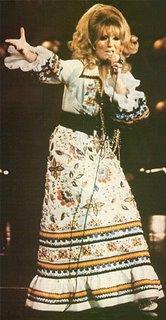Wishin' and Hopin'
“Dusty”
by the XL Capris
She was blonde and she sang so well
Dusty wore her make-up like a shell
Someone said she liked the girls too well
Dusty she sang about boys
What’s a girl gonna do
She could dance and jazz romance so well
Dust kept her breakdown to herself
Someone said she liked the girls too well
Dusty she sang about boys
What's a girl gonna do
I just don’t know what to do with myself
Wishin’ and Hopin’ and thinkin’ and prayin’
Dusty she sang about boys
What’s a girl gonna do
The internet of recent has been going on about the rumour that Ang Lee is about to tackle the topic of Dusty Springfield's life, which would make him the king of closet angst after Brokeback Mountain. Charlize Theron would make an excellent Mary O'Brien/Dusty if the casting rumour is true. She is South African and she used a British accent with good affect and to optimum effect on Arrested Development by the way.

Dusty's hauntingly beautiful voice would have endeared her to young gay people even if she herself hadn't been gay. Another appeal was her deep and enduring insecurity and vulnerability.
In the liner notes of her second album (recorded in 1964) the interview initiated on the back of the first album continues there was a small hint:
"What was your greatest handicap in starting out?
"My face and middle-class background.
The upper and lower classes are uninhibited; the middle class is too restricted."

Even in the second half of the twentieth century class consciousness was an important element in the UK, hence the iconoclasm of the British invasion artists. Dusty's rebelliousness would manifest itself in ways other than acknowledging her sexuality. She was expelled from South Africa when she refused to perform before segregated audiences. Much of her art in those days was a celebration of the rhythm 'n' blues she so admired. It was an obvious, logical and righteous decision on her part.
It is unfortunate that she could not apply that assertiveness to her own sexuality. She went into virtual self-imposed exile after stating to a journalist in an almost off-handed way that she was bi-sexual and eventually descended into drug and alcohol abuse and actual physical abuse of herself. Most people still didn't know. She was brought up in an Irish Catholic household and that tradition stayed with her even though her art didn't rely on it.
There is no denying that Dusty is one of the best artists to come out of the Sixties Musical Renaissance. There is no denying that it is pathos and vulnerability that enhanced her status. There is no denying her entrance into that pantheon of gay mythology not because she was politically correct as far as sexual politics are concerned, but because she was one of those creatures like Rock Hudson who created a stage persona that resonated.


Interestingly enough it was the stage persona that she hid behind that appealed to her gay male followers. She was a virtual drag queen. The first two albums depict Dusty simply enough in denim. By the third album La Springfield was in full force as almost a caricature of the continental style. Also interesting is that it was the Mary side of her personality , young, insecure, Irish Catholic schoolgirl, persona that seemed to embody the lesbian.
In spite of her long association with the very obvious and mullet coifed Vicki Wickham, there are still those, even in the music business who don't know that Dusty was indeed a lesbian. Wickham, who seems to have some issues with Dusty's issues, was not her lover but did accept her posthumous induction into the Rock and Roll Hall of Fame after being introduced by Elton John and celebrated in song by Melissa Etheridge. Wickham did write what has come to be considered the definitive biography of Dusty if not a universally accepted one.
If it is indeed true that Ang Lee wants to film this subject, he will once again depict something hauntingly sad, and in this case very true. In spite of some very valid criticism that the gay community was given another tragic story in his last effort, it is something that needs be addressed.
All civil rights struggles need to address the negative. Demons need to be faced in order to be banished. Dusty's story is riveting in that her suffering was so unnecessary and that her artistry brought so much satisfaction and catharsis to those who loved her.
Wikipedia has a great entry on her life and work -- go here

Comments
http://enjoyment.independent.co.uk/music/features/article347579.ece
We'll post it in Dusty's section in our Music gallery